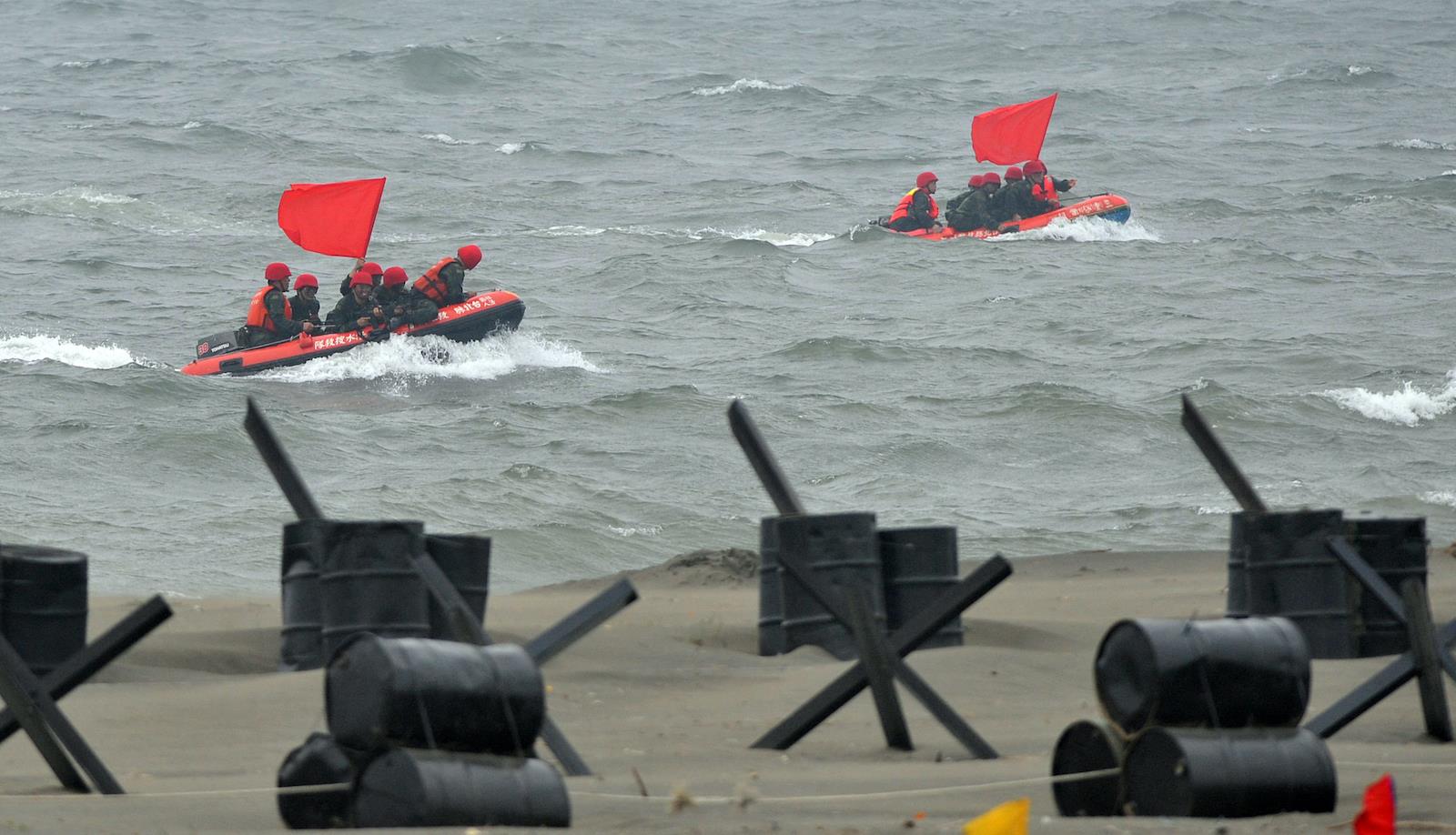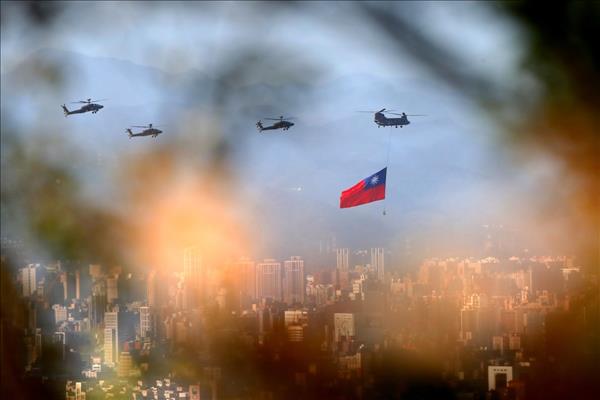
Southeast Asians Sticking With China On Taiwan: Survey
A recent Democracy Perception Index survey of worldwide public opinion found that a majority of Southeast Asians would not support their governments cutting economic ties with China if Beijing launched an invasion of Taiwan.
The same report found that only Singaporeans, from the six Southeast Asian countries surveyed, favored cutting economic ties with Russia because of its invasion of Ukraine in February. Indonesians and Vietnamese were two of the three nationalities who believed most strongly that ties with Russia should be maintained.
The Democracy Perception Index 2022 survey, published this month by Latana and the Alliance of Democracies Foundation, asked respondents:“If China started a military invasion of Taiwan, do you think your country should cut economic ties with China?”
Indonesians were again in the top three national groups that wanted to maintain ties. A net majority of respondents from all six Southeast Asian states surveyed also said their own governments should maintain economic relations in this eventuality, including Vietnamese and Singaporeans. Filipinos were almost divided equally on the question.
Almost all Western democracies and their main Asian partners, like Japan and South Korea, support cutting economic ties with China if it invades Taiwan, according to the survey.
Tensions over Taiwan have escalated in recent weeks. While on a tour of Japan earlier this month, US President Joe Biden appeared to make the strongest statement of American support for Taiwan in recent times.
Asked if the US would intervene militarily if China were to invade Taiwan, Biden replied:“Yes.” He added:“That's the commitment we made.”
The State Department quickly tried to roll back Biden's words, saying that America's long-term policy of“strategic ambiguity,” of not saying whether it would intervene militarily or not, was still in place. The 1979 Taiwan Relations Act, which governs US relations with the island, does not require US military intervention.

Taiwanese soldiers take part in a drill simulating a Chinese military invasion in Tamshui, a coastal district of New Taipei City in northern Taiwan, on April 11, 2011. Photo: AFP / Patrick Lin
On Monday, China made the second-largest incursion into Taiwan's air defense zone this year. Taipei said 30 Chinese planes, including 20 fighter jets, entered the area and it had to scramble its own aircraft and deploy air defense missile systems to monitor the situation.
Southeast Asian governments, all of which recognize Beijing's so-called“One China” policy, are extremely hesitant to discuss Taiwan. Lee Hsein Loong, Singapore's prime minister, has long called for restraint and a continuation of the status quo over the Taiwan Strait.
“One conclusion, which many of us looking at the Ukrainian situation will assess, is that when you have a conflict, it is easy to start, but it is very difficult to tell how it will end,” Lee said this month in an interview with Japanese media group Nikkei, referring to Taiwan.
“And you have to assess not just what happens in the direct conflict, but the broader consequences … How other countries will react, how it affects your standing internationally, and also the price of the war and bloodshed,” he said.
In late March, thousands of American and Filipino forces began one of their largest joint military exercises in years, which included mock beach landings in the northern Philippines near its sea border with Taiwan.
But Filipino officials were keen to stress that this indicated nothing about Manila's view of the Taiwan question.
Similarly, Taiwan's dealings in the region are also kept as quiet as possible by Southeast Asian governments, which are wary of angering Beijing.
In 2016, during her first term in office, Taiwanese President Tsai Ing-wen launched a New Southbound Policy (NSP) to improve relations with Southeast Asia and South Asia.
Pasha L Hsieh, associate professor and Lee Kong Chian Fellow, Yong Pung How School of Law Singapore Management University, says most cooperation stems from economic links.
In April, the total trade volume between Taiwan and the 10 ASEAN countries was US$11.5 billion, up a quarter from April 2021, according to Taiwan's Ministry of Economic Affairs. Singapore and Malaysia are the region's largest trading partners with Taiwan.

The Taiwan Food Court in Taiwan City, Johor, Malaysia. Taiwan has good ties with many Southeast Asian countries. Photo: WikiCommons
An estimated 37% of Taiwan's foreign direct investment in 2021 went to Southeast Asia, according to data from Taiwan's Investment Commission.
However, Taiwanese investments tend not to attract headlines. Southeast Asian governments rarely give them much fanfare, wary of Beijing's response.
Taiwan's soft power in the region can be seen in a substantial increase in Southeast Asian students at Taiwanese universities in recent years, Hsieh noted.
Local Taiwanese media reported that 30,000 students from ASEAN were studying in Taiwan in 2018, up from 16,000 in 2014.
“A growing number of my students and colleagues are interested in spending research and study time in Taiwan because it's Asian, democratic and globalized, with geographical proximity to home,” said Thitinan Pongsudhirak, a professor and director of the Institute of Security and International Studies at Chulalongkorn University's Faculty of Political Science in Bangkok.
“For many Thais, particularly younger demographics, who are not big fans of the US' international pontification and domestic dysfunction while being skeptics of China's authoritarian ways at the same time, they look to Taiwan as where they could and should be,” said Thitinan.
There are almost no surveys of Southeast Asian public sentiment about a possible Taiwan crisis. The annual State of Southeast Asia surveys, produced by the ISEAS-Yusof Ishak Institute, do not ask any questions about Taiwan.
And the results of the aforementioned Democracy Perception Index 2022 survey could be interpreted in several ways.
Even if most Southeast Asians don't want their governments to cut ties with China in the event it invades Taiwan, that doesn't necessarily mean they aren't sympathetic to Taiwan.
Most Southeast Asian respondents were sympathetic to the plight of Ukrainians because of the Russian invasion, although a majority didn't want their governments to cut economic ties with Russia as a result.

A Chinese dragon dance in Sukadana, Indonesia. Photo: WikiCommons
China is the largest or second-largest trading partner of almost every Southeast Asian state. It is also the major investor in most. Any change to these economic ties would be disastrous for Southeast Asian economies.
Economics, not war, were key concerns for many Southeast Asians, the survey found. Malaysians and Indonesians were the top two national groups who thought economic instability was one of the world's top three biggest challenges.
No Southeast Asian country was ranked in the top 10 as saying that war and violent conflict were major global problems. Only 37% of Malaysians said so, one of the lowest percentages of the 53 surveyed countries.
One conclusion could be that economic self-interest explains why Southeast Asians don't want their governments to cut ties with China in the event of an invasion of Taiwan, even if this doesn't mean they aren't sympathetic to Taiwan's sovereignty claims.
However, Indonesians were most fervent about their government not cutting economic ties with Russia or China, according to the survey. That makes sense on a self-interested level regarding China, Indonesia's largest trading partner, but is more questionable about Russia, not one of its top-15 trading partners.
Even more oddly, a bigger net percentage of Indonesians argued for maintaining economic ties with Russia than with China. Economic self-interest clearly isn't the only motivating factor at play.
Follow David Hutt on Twitter at @davidhuttjourno

Legal Disclaimer:
MENAFN provides the
information “as is” without warranty of any kind. We do not accept
any responsibility or liability for the accuracy, content, images,
videos, licenses, completeness, legality, or reliability of the information
contained in this article. If you have any complaints or copyright
issues related to this article, kindly contact the provider above.

















Comments
No comment